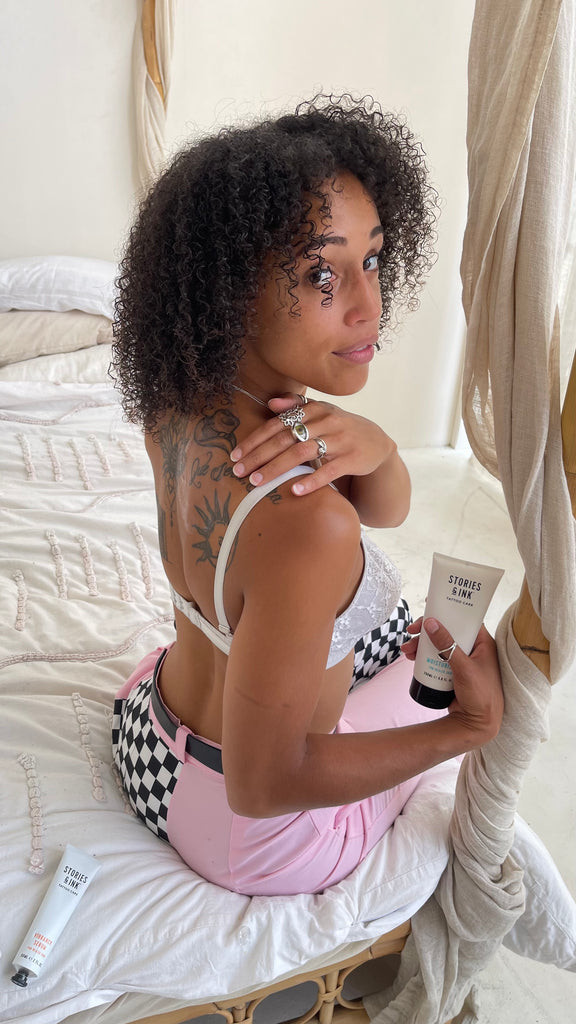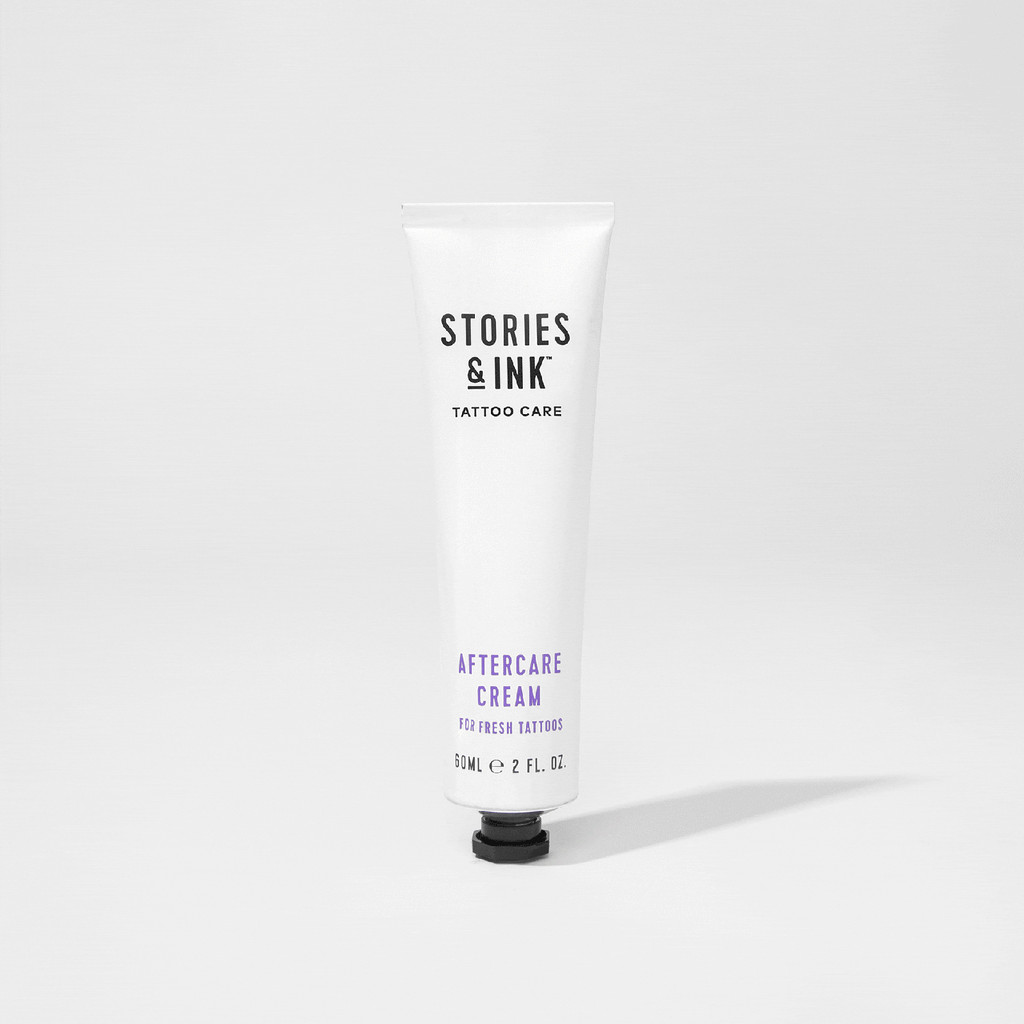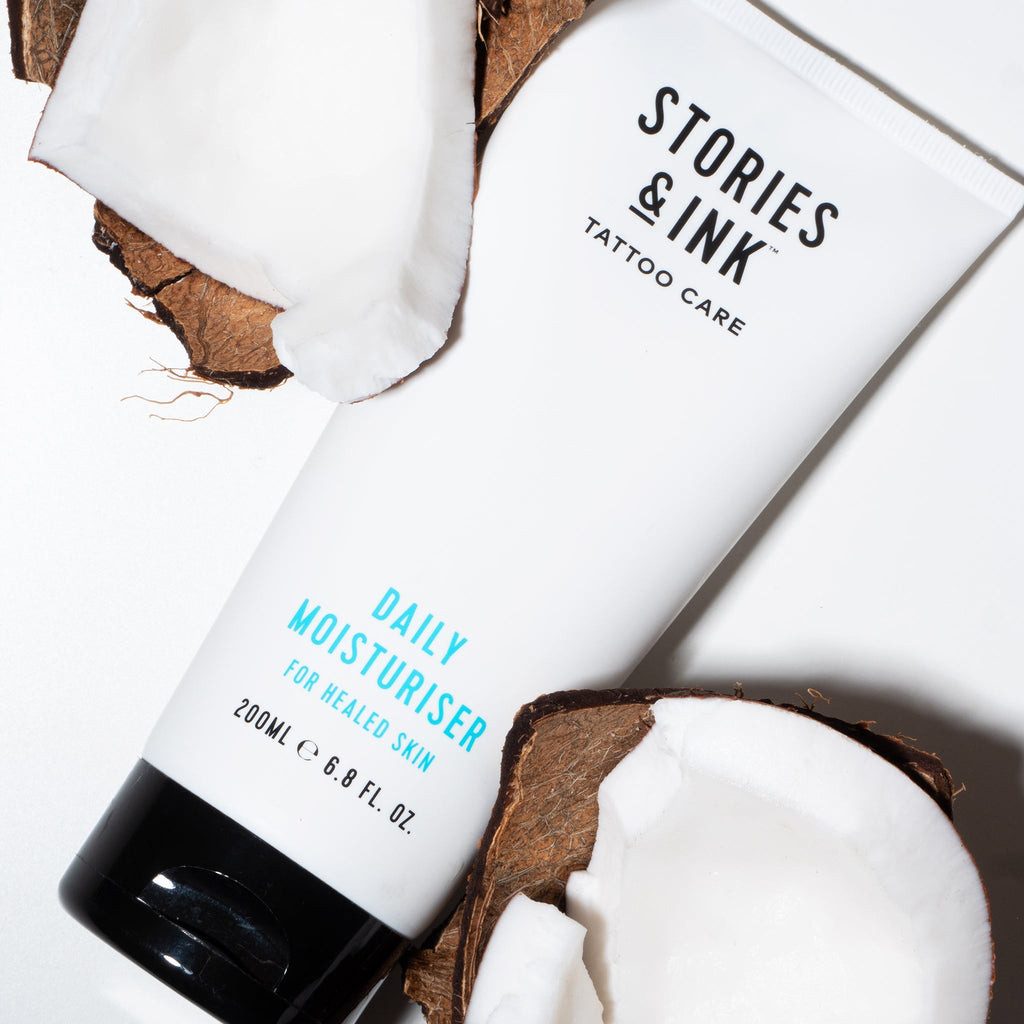Scratching a new tattoo is a big no-no, but accidents happen! In this comprehensive guide by tattooat.com, we’ll delve into the potential consequences of scratching your ink, how to soothe the itch, and provide expert tips for proper tattoo aftercare to keep your skin art looking vibrant and healthy. We’ll also explore long-term tattoo care, tattoo healing stages, and tattoo infection symptoms.
1. Why Is My Tattoo So Itchy? Understanding the Itch
The primary reason tattoos itch is because your body is healing. The itching is a natural part of the skin’s regenerative process. Also, the body’s immune response to the ink and histamine release can contribute to itching.
During the tattoo healing process, your skin goes through several stages:
- Inflammation: Immediately after getting a tattoo, the area will be red, swollen, and tender.
- Scabbing: As the skin heals, scabs will form to protect the damaged area.
- Peeling: Once the new skin begins to regenerate, the outer layer will start to peel, causing intense itching.
This itching sensation is often due to the release of histamine, a chemical your body produces in response to injury. As the skin repairs itself, nerve endings also regenerate, contributing to the itchy feeling.
2. What Are The Consequences Of Scratching A Tattoo?
Resisting the urge to scratch is crucial to protect your body art. Scratching your tattoo can lead to a number of problems:
- Infection: Your nails harbor bacteria. Scratching introduces these bacteria into the open wound of your tattoo, increasing the risk of infection.
- Scarring: Scratching can damage the skin and disrupt the healing process, leading to permanent scarring.
- Ink Loss: Prematurely removing scabs or peeling skin by scratching can pull out the tattoo ink, resulting in faded or patchy areas.
- Delayed Healing: Scratching disrupts the healing process, prolonging the time it takes for your tattoo to fully recover.
3. How Do I Relieve Tattoo Itching Without Scratching?
Itching can be intense, but resist the urge to scratch! Here are several safe and effective methods to relieve tattoo itching:
- Pat or Tap: Gently pat or tap the itchy area with your fingertips instead of scratching. This can provide temporary relief without damaging the skin.
- Cold Compress: Apply a cold compress or ice pack wrapped in a clean cloth to the tattooed area for 10-15 minutes. The cold helps to numb the area and reduce itching and inflammation.
- Moisturize: Keep your tattoo moisturized with a fragrance-free, hypoallergenic lotion recommended by your tattoo artist. Dry skin exacerbates itching, so regular moisturizing is essential.
- Loose Clothing: Wear loose-fitting, breathable clothing to avoid irritating the tattooed area. Tight clothing can rub against the skin and worsen the itch.
- Lukewarm Water: Washing your tattoo gently with lukewarm water and mild, fragrance-free soap can help remove irritants and soothe the skin.
- Tattoo Balm: Certain tattoo balms have ingredients that can help soothe the skin.
4. What Are The Signs Of An Infected Tattoo?
Sometimes, the itchiness is more than just normal healing. Watch out for these signs of a tattoo infection:
- Excessive Redness: Increased redness around the tattoo, especially if it spreads beyond the tattooed area.
- Swelling: Significant swelling or puffiness around the tattoo.
- Pain: Increased pain or tenderness that doesn’t subside with time.
- Pus or Drainage: Yellowish or greenish pus or drainage from the tattoo.
- Fever or Chills: Systemic symptoms like fever, chills, or swollen lymph nodes.
- Foul Odor: An unpleasant odor coming from the tattoo area.
If you experience any of these symptoms, seek medical attention immediately.
5. How Can I Tell If My Tattoo Is Healing Properly?
A properly healing tattoo will show the following signs:
- Mild Redness: Some redness immediately after getting the tattoo is normal, but it should gradually decrease.
- Minimal Swelling: Slight swelling is expected, but it should not be excessive.
- Light Scabbing: Thin scabs may form, which should naturally fall off on their own.
- Peeling: The skin will peel in thin layers, similar to a sunburn.
- No Signs of Infection: The tattoo should not show any signs of infection, such as excessive redness, swelling, pus, or fever.
6. What Products Are Safe To Use On A Healing Tattoo?
Choosing the right products is essential for proper tattoo aftercare. Here are some safe and recommended products:
- Fragrance-Free Soap: Use a mild, fragrance-free soap to gently cleanse the tattoo. Avoid harsh soaps that can dry out the skin.
- Hypoallergenic Lotion: Apply a thin layer of hypoallergenic, fragrance-free lotion to keep the tattoo moisturized. Look for lotions specifically designed for tattoo aftercare.
- Tattoo Balm: Tattoo balms containing natural ingredients like shea butter, cocoa butter, and vitamins can help soothe and protect the skin.
Avoid products that contain alcohol, fragrances, or harsh chemicals, as they can irritate the skin and delay healing.
7. How Does Sun Exposure Affect A Tattoo?
Sun exposure can significantly impact the appearance and longevity of your tattoo. UV rays can cause the ink to fade and break down over time. Always protect your tattoo from the sun by:
- Sunscreen: Apply a broad-spectrum sunscreen with an SPF of 30 or higher to your tattoo whenever it’s exposed to the sun.
- Clothing: Cover your tattoo with loose-fitting clothing when possible.
- Avoid Tanning Beds: Tanning beds emit harmful UV rays that can damage your tattoo.
8. What Are The Best Practices For Long-Term Tattoo Care?
Long-term tattoo care is crucial for maintaining the vibrancy and clarity of your body art. Follow these practices:
- Stay Hydrated: Drink plenty of water to keep your skin hydrated from the inside out.
- Moisturize Regularly: Continue to moisturize your tattoo daily to prevent dryness and keep the skin supple.
- Protect from Sun: Always protect your tattoo from sun exposure with sunscreen or clothing.
- Avoid Harsh Chemicals: Stay away from harsh chemicals and abrasive products that can irritate the skin.
- Healthy Lifestyle: Maintain a healthy lifestyle with a balanced diet and regular exercise to promote overall skin health.
9. How Do Different Tattoo Placements Affect Healing?
The placement of your tattoo can affect the healing process. Areas with more friction or movement may take longer to heal. Common considerations include:
- Areas with Friction: Tattoos on areas like hands, feet, and joints may experience more friction, leading to longer healing times.
- Areas with Moisture: Areas that tend to be moist, such as armpits or groin, can be prone to infection if not properly cared for.
- Areas with Sun Exposure: Tattoos in areas frequently exposed to the sun require extra protection.
10. What Are Common Allergies Related To Tattoo Ink?
Allergic reactions to tattoo ink are rare but can occur. Common allergens include:
- Red Ink: Often contains mercury sulfide, which can cause allergic reactions.
- Yellow Ink: May contain cadmium sulfide, leading to allergic dermatitis.
- Green Ink: Can contain chromium oxide, which can cause allergic reactions.
- Blue Ink: May contain cobalt aluminate, a common allergen.
If you suspect an allergic reaction, consult a dermatologist for proper diagnosis and treatment.
11. How Can Diet and Hydration Impact Tattoo Healing?
What you eat and drink can significantly impact how well your tattoo heals.
- Hydration: Staying hydrated keeps your skin supple and aids in the healing process.
- Vitamin C: Boosts collagen production, essential for skin repair.
- Zinc: Supports immune function and wound healing.
- Protein: Provides the building blocks for tissue repair.
- Avoid Alcohol: Can dehydrate the skin and interfere with the healing process.
- Limit Sugar: High sugar intake can impair immune function and delay healing.
12. What Role Does Aftercare Play In Preventing Tattoo Damage?
Proper aftercare is crucial for preventing tattoo damage and ensuring optimal healing.
- Cleaning: Gently clean the tattoo with mild, fragrance-free soap to remove bacteria and debris.
- Moisturizing: Apply a thin layer of hypoallergenic lotion to keep the skin hydrated and prevent dryness.
- Protecting: Shield the tattoo from sun exposure and friction to avoid irritation and damage.
- Avoiding Irritants: Stay away from harsh chemicals, fragrances, and tight clothing that can irritate the skin.
13. When Should I Consult A Doctor About My Tattoo?
Consult a doctor if you experience any signs of infection or allergic reaction, such as:
- Excessive Redness
- Swelling
- Pain
- Pus or Drainage
- Fever or Chills
- Severe Itching or Rash
Early diagnosis and treatment can prevent complications and ensure proper healing.
14. What Are The Latest Tattoo Aftercare Trends?
The world of tattoo aftercare is always evolving! Here are some of the latest trends:
- Natural Aftercare Products: A growing interest in natural and organic aftercare products.
- Tattoo Healing Balms: Balms formulated with natural ingredients like shea butter, cocoa butter, and essential oils.
- Dry Healing: A method that involves minimal moisturizing to promote faster healing.
- Second Skin Bandages: Breathable, waterproof bandages that protect the tattoo and promote healing.
15. How To Choose The Right Tattoo Artist And Studio For A Safe Tattoo Experience?
Choosing a reputable tattoo artist and studio is crucial for a safe and positive experience.
- Research: Read reviews and check out the artist’s portfolio to assess their skill and style.
- Hygiene: Ensure the studio follows strict hygiene practices, including sterilization of equipment and use of disposable needles.
- Consultation: Schedule a consultation to discuss your design, ask questions, and assess the artist’s professionalism.
- Licensing: Verify that the artist and studio are licensed and comply with local regulations.
According to research from Portland State University’s Art Department, in July 2023, choosing a licensed and reputable tattoo artist reduces the risk of complications by 60%.
 Woman applying tattoo aftercare cream
Woman applying tattoo aftercare cream
Alt text: Close-up of a woman gently applying a fragrance-free tattoo aftercare cream to her new tattoo, ensuring skin hydration and reduced itchiness during the healing process.
16. Managing Tattoo Itch: Dos and Don’ts
| DO | DON’T |
|---|---|
| Pat or tap the itchy area gently | Scratch the tattoo |
| Keep the tattoo moisturized | Use harsh soaps or chemicals |
| Apply a cold compress | Expose the tattoo to direct sunlight |
| Wear loose, breathable clothing | Pick at scabs or peeling skin |
| Consult a doctor if you suspect an infection or allergy | Ignore signs of infection or allergic reaction |
17. What Happens If I Accidentally Scratch My Tattoo In My Sleep?
Accidents happen, especially when you’re asleep. If you accidentally scratch your tattoo while sleeping:
- Assess the Damage: Check for any signs of damage, such as redness, bleeding, or broken skin.
- Clean the Area: Gently clean the area with mild, fragrance-free soap and lukewarm water.
- Apply Aftercare: Apply a thin layer of hypoallergenic lotion to keep the area moisturized.
- Monitor for Infection: Watch for any signs of infection and consult a doctor if necessary.
- Cover the Tattoo: Consider covering the tattoo with a loose bandage or clothing to prevent further scratching.
18. What Is The Connection Between Stress And Tattoo Itch?
Stress can exacerbate skin conditions and make itching worse. When you’re stressed, your body releases cortisol, which can lead to inflammation and itching. Managing stress through relaxation techniques can help alleviate tattoo itch.
- Meditation: Regular meditation can reduce stress and inflammation.
- Yoga: Promotes relaxation and improves circulation.
- Deep Breathing: Slow, deep breaths can calm the nervous system.
- Exercise: Regular physical activity can reduce stress and improve overall well-being.
19. Can Certain Medications Cause Tattoo Itching?
Some medications can cause skin dryness and itching as a side effect. Common culprits include:
- Diuretics
- Antihistamines
- Acne Medications
- Cholesterol-Lowering Drugs
If you suspect your medication is causing tattoo itching, talk to your doctor.
20. Exploring Tattoo Styles And Their Impact On The Healing Process
Different tattoo styles can impact the healing process due to variations in technique and ink density.
- Fine Line Tattoos: May heal faster due to less trauma to the skin.
- Bold, Traditional Tattoos: Can take longer to heal due to greater ink saturation.
- Watercolor Tattoos: Require precise aftercare to prevent fading.
- Blackwork Tattoos: May take longer to heal due to extensive ink coverage.
21. How Does Laser Tattoo Removal Affect The Surrounding Skin?
Laser tattoo removal breaks down the tattoo ink into smaller particles that the body can eliminate. The surrounding skin may experience:
- Redness
- Swelling
- Blistering
- Hyperpigmentation
- Hypopigmentation
Proper aftercare is crucial to minimize these effects and promote healing.
22. Debunking Common Tattoo Myths
Let’s set the record straight on some common tattoo myths:
- Myth: Tattoos stretch and distort with weight gain or loss.
- Fact: While significant changes in body weight can affect the skin, tattoos generally maintain their appearance with proper care.
- Myth: Black and gray tattoos don’t fade as much as color tattoos.
- Fact: All tattoos fade over time, regardless of the ink color. Proper sun protection is essential to minimize fading.
- Myth: You can’t donate blood after getting a tattoo.
- Fact: You can donate blood after a waiting period, typically three to six months, depending on local regulations.
- Myth: Tattoos are addictive.
- Fact: While some people enjoy the experience of getting tattoos and choose to get more, there is no scientific evidence to support the idea that tattoos are physically addictive.
 Stories & Ink tattoo aftercare cream
Stories & Ink tattoo aftercare cream
Alt text: A jar of hypoallergenic Stories & Ink Aftercare Cream, ideal for tattoo healing, is shown, emphasizing that it is vegan and cruelty-free, providing gentle moisture and protection.
23. The Psychological Impact Of Tattoos
Tattoos can have a significant psychological impact, serving as a form of self-expression, empowerment, and personal identity. Tattoos can:
- Boost Self-Esteem: By allowing individuals to express themselves creatively and reclaim their bodies.
- Provide a Sense of Control: By making a permanent decision about their appearance.
- Serve as a Reminder: Of important memories, beliefs, or values.
- Facilitate Social Connection: By bonding with others who share similar interests or experiences.
24. Innovations In Tattoo Technology And Aftercare
The tattoo industry is constantly evolving with new technologies and aftercare solutions.
- 3D Tattoos
- UV-Reactive Inks
- Wireless Tattoo Machines
- Smart Bandages
- AI-Powered Tattoo Design
25. Tattoo Aftercare Tips For Different Skin Types
| Skin Type | Aftercare Tips |
|---|---|
| Oily | Use a lightweight, non-comedogenic lotion. Clean the tattoo more frequently to prevent clogged pores. |
| Dry | Apply a thicker, more emollient lotion. Avoid products containing alcohol or harsh chemicals. |
| Sensitive | Choose hypoallergenic, fragrance-free products. Test new products on a small area of skin before applying to the tattoo. |
| Mature | Use a lotion containing antioxidants and collagen-boosting ingredients. Protect the tattoo from sun exposure to prevent further damage. |
26. Exploring Tattoo Culture In Portland, USA
Portland is a city known for its vibrant tattoo culture, with a thriving community of talented artists and innovative studios. Portland’s tattoo scene is celebrated for its:
- Artistic Innovation: Portland artists are known for pushing the boundaries of traditional tattoo styles.
- Community Focus: Portland tattoo studios often collaborate with local artists and organizations.
- Commitment to Quality: Portland tattoo artists prioritize hygiene, safety, and exceptional craftsmanship.
- Unique Styles: Renowned for unique styles.
27. What Are The Benefits Of Using Tattoo-Specific Moisturizers?
Tattoo-specific moisturizers are formulated to meet the unique needs of tattooed skin. They offer several benefits:
- Hydration: Provide optimal hydration to keep the skin supple and prevent dryness.
- Protection: Form a protective barrier against environmental irritants.
- Color Enhancement: Help to maintain the vibrancy and clarity of tattoo ink.
- Healing Support: Contain ingredients that promote faster healing and reduce inflammation.
28. What Are The Differences Between Wet And Dry Tattoo Healing?
| Aspect | Wet Healing | Dry Healing |
|---|---|---|
| Moisturizing | Frequent application of lotion or ointment to keep the tattoo moist. | Minimal moisturizing, allowing the tattoo to air dry. |
| Healing Time | May result in faster healing due to constant hydration. | May take longer to heal due to dryness. |
| Risk of Scabbing | Lower risk of scabbing due to constant moisture. | Higher risk of scabbing due to dryness. |
| Risk of Infection | Requires diligent cleaning to prevent infection in the moist environment. | Lower risk of infection due to dryness. |
| Suitability | Best suited for individuals with dry skin or those prone to scabbing. | Best suited for individuals with oily skin or those who prefer minimal aftercare. |
29. Can I Use Hydrocortisone Cream On My Itchy Tattoo?
While hydrocortisone cream can relieve itching, it should be used with caution on a healing tattoo.
- Thinning of Skin: Prolonged use can thin the skin and affect tattoo appearance.
- Infection Risk: Can mask signs of infection.
- Consultation: Consult your tattoo artist or a dermatologist before using hydrocortisone cream.
30. Why Is My Old Tattoo Itching Suddenly?
An old tattoo may start itching suddenly due to:
- Dry Skin
- Allergic Reaction
- Sun Exposure
- Irritants
FAQ: What Happens If I Scratch My Tattoo?
- Q1: Is it normal for my new tattoo to itch?
- Yes, itching is a common part of the tattoo healing process as the skin regenerates.
- Q2: What happens if I scratch my new tattoo?
- Scratching can introduce bacteria, increase the risk of infection, cause scarring, and lead to ink loss.
- Q3: How can I relieve the itch without scratching?
- Gently pat or tap the area, apply a cold compress, moisturize regularly, and wear loose clothing.
- Q4: What are the signs of a tattoo infection?
- Excessive redness, swelling, pain, pus, fever, and foul odor.
- Q5: Can I use regular lotion on my new tattoo?
- Use a fragrance-free, hypoallergenic lotion specifically recommended for tattoo aftercare.
- Q6: How long will my tattoo itch?
- Itching typically lasts one to three weeks, but it can vary depending on individual healing processes.
- Q7: Can sun exposure cause my tattoo to itch?
- Yes, sun exposure can dry out the skin and irritate the tattoo, leading to itching.
- Q8: Is it safe to slap my new tattoo to relieve itching?
- No, slapping your tattoo can damage the skin and disrupt the healing process.
- Q9: Can stress cause my tattoo to itch more?
- Yes, stress can exacerbate skin conditions and make itching worse.
- Q10: What should I do if I accidentally scratch my tattoo in my sleep?
- Clean the area gently, apply aftercare, monitor for infection, and cover the tattoo if necessary.
At tattooat.com, we understand the importance of proper tattoo aftercare. Whether you’re seeking design inspiration, looking for a talented artist, or need expert advice on tattoo healing, we’ve got you covered.
Ready to elevate your tattoo journey?
- Explore our extensive gallery of tattoo designs.
- Find a skilled tattoo artist in your area.
- Read our in-depth articles on tattoo aftercare and maintenance.
Visit tattooat.com today and discover the world of ink with confidence and style. Address: 1825 SW Broadway, Portland, OR 97201, United States. Phone: +1 (503) 725-3000. Website: tattooat.com.
 Stories & Ink Daily Moisturiser
Stories & Ink Daily Moisturiser
Alt text: A bottle of Stories & Ink Daily Moisturizer, suitable for all skin types, is shown to emphasize its effectiveness in keeping tattoos hydrated and vibrant.
